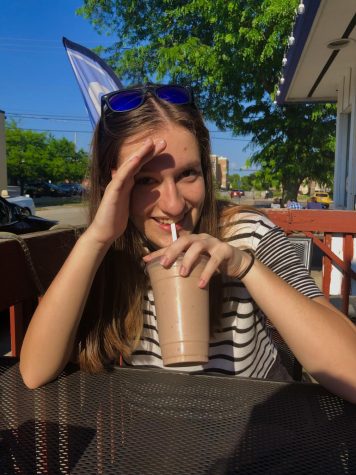“Dawn FM” Showcases ’80s Inspiration and The Weeknd’s Versatility
The Weeknd’s fourth studio album dazzles listeners with a complex narrative and synth tracks.
February 23, 2022
At the beginning of this year, The Weeknd, whose real name is Abel Tesfaye, released his fifth album, Dawn FM. The album, which lasts just under an hour, contains a very precise combination of music and spoken word, which feature the voices of Jim Carrey and Quincy Jones, a famous actor/comedian and a well-known producer. The album has been very successful thus far, and takes listeners on a journey through 80s inspired music, one The Weeknd describes as “a journey towards the light at the end of a tunnel”. This is a concept record, meaning a complex narrative carries the album. This record serves as a continuation of his last release, “After Hours”, and is said to be the second installment in a potential trilogy. After several months of anticipation and hints from Tesfaye, the full album was released on January 7th.
The album opens with “Dawn FM”, and serves as the introduction to a fictional radio station that we are listening to and will hear about throughout. It begins with what one might consider the typical 80s’ intro, with the music rising and some interesting, ambient noises in the background. When The Weeknd’s voice enters, it gives off a very spooky feeling, as his vocals do not necessarily match the vibe given off by the instrumentals. Tesfaye’s voice sounds a bit disconnected from the 80s’ vibe, creating the creepy feeling as he sounds almost like he’s disrupting the instrumentals. He hints at the journey mentioned earlier, speaking of a road he is beginning on by himself. This is the first hint we get that the album is presented in a particular order and that it is arranged as it’s meant to be heard. It also shows that The Weeknd himself is a character that presents the story to us. He is joined by female backing vocals, and the song becomes very crowded. Then, there is a smooth transition into Jim Carrey introducing ‘103.5 Dawn FM’ in a typical radio host tone. He says some pretty cryptic things, such as: “It’s time to walk into the light and accept your fate with open arms”, leaving the audience wondering what will happen next, and eager to learn more.
The second track, “Gasoline”, begins immediately with a synth intro. The Weeknd begins to sing, but his voice sounds much deeper and more intense than it did in the previous song. During the second verse, a robotic-sounding voice joins him in the melody, adding an extra layer, enhancing the depth, and making it more interesting to listen to. About a minute into the song, The Weeknd begins singing in the style audiences are used to, using his typical tenor/falsetto range, marking an interesting transition. He tells the story of an addict and his love interest, talking about how he feels whilst high and talking about his relationship as well. He sings about serious topics in an upbeat way, with energetic music in the background, mixing contrasting emotions. The instrumentals being so high energy can distract from the meaning of the words themselves, but understanding the message of the song serves as an extra level of connection between Tesfaye and the listener. It almost feels like an easter egg as the listener when you figure out exactly what the lyrics mean. He sings of feelings of depression, wanting to die, struggling to find a will to live, and debating what happens after life is over. It’s a morbid song, built off of startlingly dark lyrics but with the 80s’ influence making it seem like it’d be much happier.
“How Do I Make You Love Me?” begins in a much more cooled-down and relaxed way than the previous track, albeit with equally thought-provoking lyrics. The chorus brings up the energy in the instrumentals and features a beat drop before he asks how to make someone fall in love with him forever. He tells his love interest how he can make her feel emotions again after referencing something in her past that made her “cold inside”. He switches perspectives throughout the song, both talking to a woman about what he can do for her, then talking about what he wants personally. The vibes of this song remind me of a darker ABBA song, with the way the music builds and falls. The outro lasts nearly a minute, but moves flawlessly into the next song, blurring the lines between the two.
“Take My Breath” has a much more intense, chaotic vibe to it. The intro carries on for nearly a minute and a half, which did get a bit redundant, building in levels until they fall away when The Weeknd begins to sing. As for the storyline, he seems to be speaking to someone who is addicted to something, echoing similar lines that he sang in the last song, again signifying the relationship between the two. The love interest has now reciprocated the love he wanted her to feel for him, but she is having some morbid thoughts of her own now. Their love is intense and chaotic as the song signals, and he hints that she is much more into it than he thought. The song is nearly six minutes long, but it remains almost stressful to listen to as the levels shift and rise consistently.
“Sacrifice” has an intro that sounds very similar to one Michael Jackson might have used. The lyrics seem to show the breakdown of the relationship mentioned in the last two songs. He hints that he gave up his relationship in order to carry his addiction on and alludes to his commitment issues and love of his time alone. He tells her that life is worth living, but that she shouldn’t develop feelings for him because it won’t go in the way she’d want. This song carries a much different attitude towards this woman than we’ve seen before, and their relationship has clearly changed. The song has a bit of a frantic feeling to it, making it a more stressful song to listen to with the fast-paced instrumentals and echoing vocals. It’s an interesting song, but the high-energy nature of it can be a bit draining to listen to.
“A Tale By Quincy” involves soft guitar and some synth elements behind Quincy Jones talking about raising a fictional child of his, presumably a character in the album’s storyline. He states that he was not the best parent and didn’t make the best choices all the time, but still loves his child. He mentions his own childhood experiences, saying his mother was sent to a mental institution. He says he always thought he didn’t need a mother, a statement that is said with spookier-sounding music in the background. It seems like Jones represents an older version of the Weeknd’s character, as he details how his romantic relationships quickly deteriorate, something we heard happen before. It is an interesting change in point of view for the listener and makes the storyline we’re seeing even more detailed and intricate.
“Out of Time” almost sounds like something you’d hear in an elevator at first, calm and soothing. The Weeknd is more of a crooner here, slower and matching the music, though not with the lyrics. He is still singing to the love interest, but she has moved on to another man. He repeats that he wishes he could say more to her, but that he is out of time. He wishes for a second chance and encourages her to come back as soon as she is unhappy. There’s a sense of uneasiness in the song, and the listener definitely is roped into feeling that as well. He laments about the commitment issues he mentioned earlier, wishing things were different. Then, the song winds down until Jim Carrey’s voice comes back as the radio host. He’s much creepier this time, saying that we, the audience, are also out of time, and not to panic. He alludes to the fact that heaven is waiting at the end of the album, producing an uneasy feeling as he tells us what’s to come.
“Here We Go… Again”, a track that features Tyler, the Creator, begins with the Weeknd talking about a new girl who’s starting to fall for him as they celebrate during winter (he mentions the Super Bowl). It very much feels like a song that would be played as a long night of partying is winding down. He talks about how his new girlfriend is a movie star, which has since been speculated to be a reference to Angelina Jolie. This song is much more hopeful and uplifting than any of the others, talking about new love and having a reason to keep living. Tyler echoes the thoughts of exploring a new connection and falling in love. He matches Tesfaye’s energy very well, and it makes for a great feature. His voice fades out with a glitch effect, which makes for an interesting strategic choice in this intricate plotline. The song ends with another reference back to Dawn FM as a radio station, but in a much less cryptic way than before.
“Best Friends” picks up the synth instrumentals right away at a renewed intensity.. The story shows the Weeknd essentially friend zoning a girl and limiting their relationship, muddling the storyline even further. Tesfaye (or his character), seems to be going back and forth with the same girl, making the timeline of the story a bit trickier to make out than before when there was clear linear progression. There’s a bit more repetition in this song, and it is definitely one of the weaker ones. The instrumentals are excellent, but the lyrics aren’t as exciting due to the repetition and because they don’t match the music at times. The repetition present doesn’t quite fit with the synth behind it, again enhancing the feeling that Tesfaye’s voice is disrupting. Dawn FM appears again, but this time with a message after it simply says “Wish Line”, taking the listener to a new section of the story.
“Is There Someone Else?” begins similarly to the way “Tonight, I Wish I Was Your Boy” by The 1975 begins, with a high-pitched, unintelligible voice singing in the intro. The Weeknd’s tone finally matches the music behind him, making for an easier listening experience as everything seems to fit together. At this point, the storyline is a bit difficult to decipher, and it’s hard to tell where this one connects to where we were at the end of the last song. I do like this song a lot, but in the context of the work as a whole, I’m not sure this one best fits here. Trying to see where the plot gets a bit distracting and can take away from the musicality of the song as a whole in this one.
“Starry Eyes” marks another seamless transition between two songs. He is talking about how his new love interest is broken and suffering, and how he wants to be there for her. Once again, it’s hard to tell where the storyline is and what the characters are doing. This song is another example of one where the music is very good, but the lyrics don’t match and the Weeknd’s voice sounds like it doesn’t fit with the musical choice made. It all sounds a bit disconnected and wasn’t a very memorable song.
“Every Angel is Terrifying” is certainly a continuation of the point made earlier that heaven is at the end of the album. The Weeknd talks over people in a crowd asking to be heard, and it’s quite unsettling. He says some very dark things about the human condition while more synth plays in the background and the noises of people talking fade out. Cheering can be heard at the end of his speech before a more unnerving beat takes over. The afterlife is made into an advertisement, making this the commercial break before we reach the end. We are invited to join, and the voice gets deeper at certain words, showing a sense of danger and uncertainty.
“Don’t Break My Heart” revisits the topic of addiction shown in the first few songs of the album, but it is portrayed in a generally more hopeful way. The music and vocals match up once again, helping the song flow better. It seems to be up to interpretation if he is comparing a person to drugs or is actually personifying drugs. He is pleading and slowly becomes more frantic with his words as the song goes on and clearly gets more overwhelmed.
“I Heard You’re Married” (featuring Lil Wayne) echoes similar sentiments to “Is There Someone Else?”, making the two songs fit better within the scheme of the album. He again tells his love interest to leave her other relationship if she’s unhappy, but he seems more receptive to what she thinks, and it’s also in the context of marriage, making the implications a bit more serious. I don’t think Lil Wayne’s voice fits the best into this song, as his way of singing isn’t smooth enough to match the tone of The Weeknd’s vocals, and he sounds a tad out of place. The autotune sounds grating next to the music, but the verse itself fits nicely into the rest of the song.
“Less Than Zero” features vocals that are much slower than the tempo of the music. The lyrics sound like they belong to a much slower, sadder song, but instead, there is a lot of production, and it works surprisingly well. This is one of the more memorable songs off of the album, all the layers blend together excellently in a way that hadn’t been achieved yet. I would say this one is my favorite of the album.
“Phantom Regret by Jim” once again features Jim Carrey, who is much slower and more mellow than before. This spoken word portion contains more rhyming, making it very soothing to listen to. It almost seems like something someone could easily fall asleep to. His voice begins to echo and whisper as he carries on. We have clearly reached heaven and the afterlife as was alluded to. It seems as if the audience is now living in some kind of purgatory that is Dawn FM, where Jim Carrey’s character, the radio host, waits for us to be ready to move on and the Weeknd sings in the meantime.
This album was clearly made to be played sequentially, as the storyline is essential to the listening experience. I would recommend this album if you enjoyed “After Hours” or if you enjoy narrative-style albums. But listening out of order doesn’t seem like it would be the most easily understandable or even correct choice to make. The songs are all good, but they fit into a larger puzzle and aren’t meant to be taken individually as pieces. This is an example of a piece of music that must be ingested whole, something that can be difficult to do. I liked this album, but it does cater to a very specific kind of listener, and can’t easily be taken apart and fit into separate playlists. “Dawn FM” was excellent as a whole, but when broken down into pieces, it simply doesn’t work as well. If concept albums are your thing, definitely give this a listen. If they aren’t, some of The Weeknd’s other albums might be more interesting to you.



